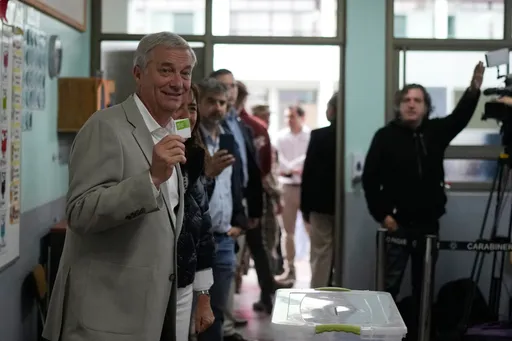“There is Such a People”, a political party founded by TV host and singer Slavi Trifonov, marked a sensational debut into Bulgaria’s political scene earlier this month. His second-place result in the recent elections revealed a dramatic change in voter preferences and further enriched the expanding “celebrity politician” phenomenon.
In the world of celebrity politicians, perhaps the first names to come to mind historically are former American President Ronald Reagan and Governor Arnold Schwarzenegger. Since then, the trend has continued, evolved, and boomed. Now, it appears that the oddly specific comedian’s era in politics has begun.
Ukraine’s president Volodymyr Zelensky, once a sitcom star, now tries to manage a political crisis while a storm with Russia is brewing. Similarly, until last year, Guatemala was governed by the comedy actor Jimmy Morales. Along the same lines, Marjan Sarec – a comedian who parodied the former prime minister Janez Jansa – became Slovenia’s head of Government.
In his book The Image: a guide to pseudo-events in America, Daniel Boorstin defines a celebrity as “a person who is known for his well-knownness”. Auxiliary research conducted in the US shows that although people are prone to accept celebrities' opinions, “at least in the case of foreign policy the respondents are more likely to adopt the non-celebrity position than the celebrity position”. If this is true, how did comedians make their way into politics?
According to Francesco Alberoni, celebrities are a new ambivalent group situated between the institutional power and disenfranchised masses. Most importantly, their political rise can be linked to mass media and the entertainment industry’s ever-expanding power. This rise has led to not only visibility, but also familiarity.
Volodymyr Zelensky gained popularity through “The Servant of the People”, a television show in which he played the president of Ukraine. Similarly, Morales almost became a president in the 2007 movie “A President in a Sombrero”.
Dressed as a Jedi
In these cases, voters develop a sense of familiarity with the fictional character of the political nominee and associate it with their real identity, also known as parasocial interaction. In their book “Politics, Media and Modern Democracy”, Paolo Mancini and David Swanson state that the growing interest in individuals over institutions and ideas blur the politician-artist barriers and create illusionary identities, such as villains or heroes.
Compounding that, a lack of attractive options among current political figures has favoured the celebrity novices. Interestingly, celebrities’ impressive oratory skills and ability to use body language also allow them to deliver more convincing speeches and detract attention from their level of expertise in politics. In this context, Richard Nixon’s failure in the first televised presidential debate offers an informative example.
Returning to Europe, Jón Gnarr, a stand-up comic and former punk-rocker served as mayor of Reykjavik - the capital city of Iceland - from 2009 to 2014. His “Best Party”, dominated by musicians and artists, promised each voter whatever they wanted during the campaign. Gnarr took this further by assuring to make the Icelandic Parliament drug free in ten years. His source of strength — in his own words — “like every other politician, he would never have to deliver on his commitments”. After taking over the office, he did not change his idiosyncratic tone: he wore pink suites, dressed as a Jedi, and angered other lawmakers by opposing NATO’s use of Iceland for missions.
Gnarr ended up abandoning politics after one term. He wrote a book about his experience and created a tv show, aptly called “The Mayor”, which followed the political adventures of Reykjavik’s mayor. Gnarr himself embodied the peculiar storyline as a comedian-turned-politician.
Returning to reality, despite his "Neither corrupt, nor a thief" campaign slogan, Jimmy Morales left office after just one term after being the target of an anti-corruption mission. Currently, Guatemalan prosecutors are working to deprive him of his immunity. Marjan Sarec, in pursuit of a more serious image, promised to conclude his acting career. However, his on-camera life was not the only thing to end. His minority government struggled to survive and after just two years in the office, in an official statement, he said, "I cannot meet the expectations of the people with these deputies and this coalition at the moment, but I can fulfil them after the elections". Yet, opportunity often knocks but once.
On the other hand, “The Servant of the People'' is still in charge. However, despite his strong start, the 2020’s local election illustrated a decline in Zelensky’s popularity. He has been criticized for appointing inexperienced figures to key positions. Additionally, Oleksiy Honcharukhen, then prime minister, was secretly recorded saying that Zelensky is “a greenhorn” in economic matters.
Enter the newest member of the club: Slavi Trifonov hosted one of the most famous talkshows in Bulgaria for 19 years. He is considered both familiar and sincere to the Bulgarian audience. The show came to an end because of a “different understanding of freedom” with the broadcaster. Trifonov then founded his television 7/8 TV and catapulted into politics with a party name inspired by his song, ‘There is No Such State’. When the court refused to register the party, he changed it to mirror the album name – “There Is Such A People”. After a long battle, supported mainly by the young, Trifonov’s party succeeded in placing second in the elections last month.
As was the case with both Zelensky and Gnarr, Trifonov chose a populist name for his party. Similar to Sarec, he satirized the prime minister in his talk show. Perhaps, he will succeed in avoiding Morales’ fate.
“The Best Party”, “The Servant of the People”, and “There is Such People” are the face of voters’ changing attitudes, a desperate Mayday call of sorts. There is no problem with an artist entering politics; the issue occurs when fame is their only feature.
Biden is unlikely to be impressed by Trifonov’s successful musical career and Putin will not seek calm in Donbas thanks to Zelensky’s great sense of humour. The real danger comes when – as Wright Mills points out - “rather than being celebrated because they occupy positions of prestige, they occupy positions of prestige because they are celebrated”.
























